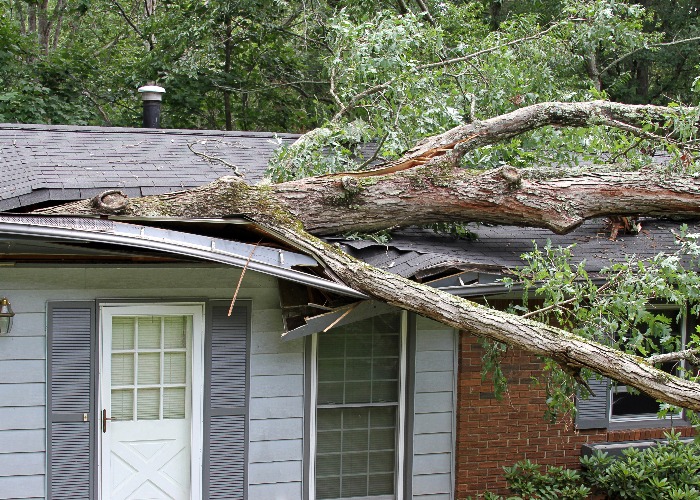Storm damage: how to claim on your home or car insurance

If you've been affected by stormy weather and need to make a claim on your home or car insurance, here's what you need to do.
Storm Éowyn is expected to cause havoc for large parts of the UK today, bringing rain and winds of up to 100mph.
The Met Office has issued a red weather warning for Northern Ireland and parts of Scotland, meaning there is a danger to life, while 11 less severe amber and yellow warnings have been put in place across the UK for today and Saturday (25 January).
While the most important thing at this point is to ensure everyone remains safe, there will inevitably be financial implications to consider in the days ahead.
If your car or home gets damaged by the storm, here's what you need to do to claim on your insurance policy.
Here's how to flood-proof your home
What to do if your home is damaged
1. Call your insurance company as soon as possible. Most firms provide a 24-hour helpline for policyholders to call for advice.
2. If you can, take photos or videos of the damage as this may help support your claim.
3. Keep water-damaged furniture and other items that have been damaged. Don't dispose of any items of value until you're told to by a loss adjuster.
4. Get emergency repair works that will prevent further damage as soon as possible. However, more elaborate or permanent measures should not be taken without prior approval from your insurer.
5. Check whether your insurance company offers alternative accommodation as part of your cover. It's possible that you could be re-housed for weeks, so keep a complete record of any additional spending while you're not living at home.
You should also make sure you:
- don't use electricity or gas supplies;
- don't drink tap water until you've been advised that it's safe to do so;
- move essentials and valuables to safety. You should transfer food, clothing and televisions upstairs to limit damage, and move furniture away from the walls.
Read more: why insuring a flood-risk home is a nightmare
What to do immediately if your car is damaged
1. If you have comprehensive car insurance, dig out your policy and check to see what level of cover you have for flood or other storm damage. Call your insurer's helpline for advice.
2. Again, if you can take photos or videos of the damage as this may help to support your claim.
3. Check whether your insurance company offers a replacement vehicle as part of your cover.
Save on your car insurance with MoneySupermarket (affiliate link)
What to do later on
1. Consider hiring your own loss adjuster. In theory, loss adjusters are supposed to be independent mediators, but you may want your own assessment of the damage in case of a dispute.
2. Keep all receipts and other relevant paperwork safe. You'll need them to support your claim.
If you have a problem with your claim
If you feel that your claim isn't being dealt with quickly enough by your insurer, or your insurer rejects your claim, you can contact the Financial Ombudsman Service (FOS).
It can contact the insurer on your behalf to try to get a resolution. You'll find more information on the Financial Ombudsman Service's website.
Bear in mind that the insurer has eight weeks to respond to your complaint.
Renewing your insurance policy
Finally, if you've been bailed out by your insurer, then you may find that your neighbourhood is later categorised as a high-risk area.
So watch out for higher policy excesses or premiums when your next renewal notice arrives.
After a big claim, or if your home is prone to flooding, you may find it difficult to find cover elsewhere, so this may be one of those occasions when you may be better off sticking with your current provider.
That doesn't mean you shouldn't still shop around to compare deals though.
Comments
Be the first to comment
Do you want to comment on this article? You need to be signed in for this feature